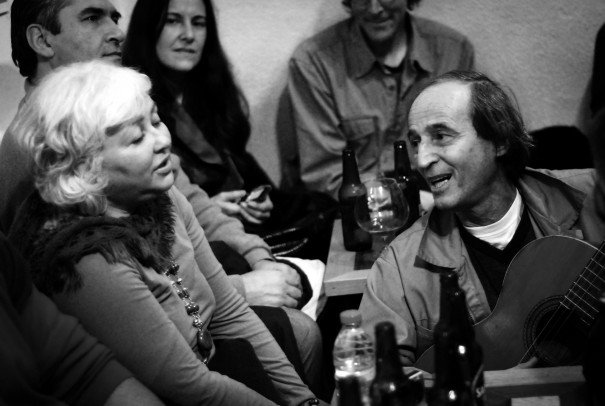
Broken Songs of Lisbon

Tejo Bar in Lisbon, where there is nothing borrowed about the melancholy.
The last note was always out of reach and the fall was long and lusty. No matter. The failure had a broken beauty of its own and the crowded room showed its approval in its strange, mute way: by rubbing the hands together. All spent, the old lady of Lisbon slumped back against the wall and in the half-light more hands reached for the songbook eager to give voice to their own stories of loss and the permanent damage left behind.
If the traditional Portuguese song is about lyrical excellence then its rightful home is at the Museu or Clube do Fado where extraordinary singers give voice to others’ pain. But if Fado is about the feelings themselves—about saudades—then by right it also lives a little further up the cobbled streets of Alfama in the Beco do Vigario. When the hillside district’s tourist restaurants, with their mediocre menus and gloriously dilapidated buildings, close their doors, the has-beens and never-weres of Fado take off their waiters’ garb, close up shop and start the climb to Tejo Bar. Here the broken hearts are sung of in broken voices and there is nothing borrowed about the melancholy.
Run by a slightly pot-bellied leftist with a taste for dark berets and Che Guevara, the bar’s aural concession to its neighbourhood is a ban on clapping, with patrons told to rub their palms in appreciation of the nightly amateur music.
My introduction to Tejo came from an old alcoholic woman loaded with carrier bags full of unexplained underwear who leapt from her street bench one night and insisted on guiding us into the warren of Alfama—Lisbon’s haunting glory where crumbling tenements defended by fierce tenants rights are propped up by stone and marble churches from Portugal’s days of empire. At the end of the trail, through heavy wooden doors, were the veteran drinker’s friends: strong beer and the chance to give musical vent to the regrets of a life roughly lived. There’s little doubt that the prostitutes and dockworkers, sailors and working men who lived near the riverside where Fado was born and became the scandal of the educated classes in 1830s Lisbon would have recognised the bag lady and known what she was singing about.
[Photo by Diego Lourenço Gurgel]
—
For some of Tejo Bar’s music on YouTube, there is this chaotic little jam session, or this four-part documentary.